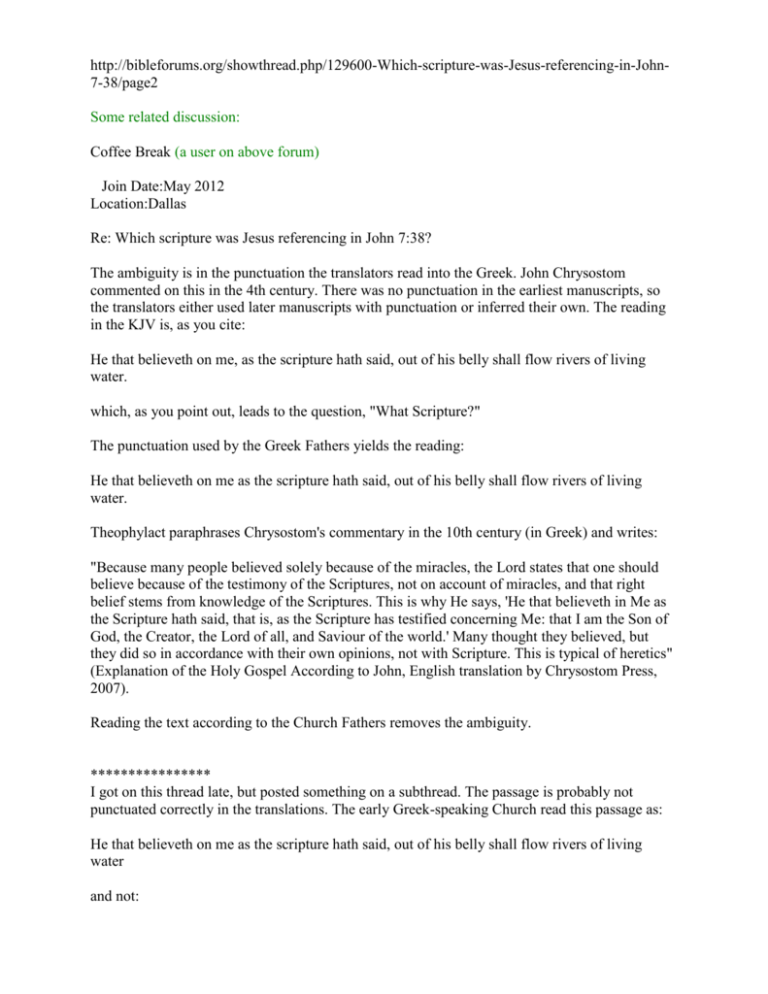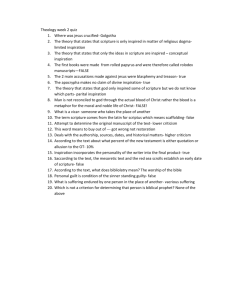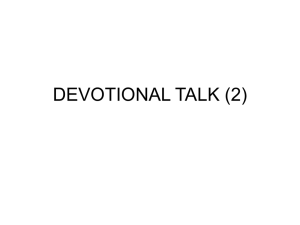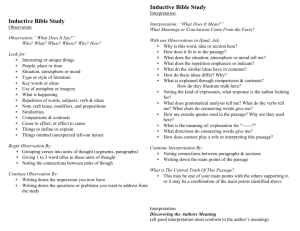Insert A for Discourse 1 page 9 - Cotopaxi
advertisement

http://bibleforums.org/showthread.php/129600-Which-scripture-was-Jesus-referencing-in-John7-38/page2 Some related discussion: Coffee Break (a user on above forum) Join Date:May 2012 Location:Dallas Re: Which scripture was Jesus referencing in John 7:38? The ambiguity is in the punctuation the translators read into the Greek. John Chrysostom commented on this in the 4th century. There was no punctuation in the earliest manuscripts, so the translators either used later manuscripts with punctuation or inferred their own. The reading in the KJV is, as you cite: He that believeth on me, as the scripture hath said, out of his belly shall flow rivers of living water. which, as you point out, leads to the question, "What Scripture?" The punctuation used by the Greek Fathers yields the reading: He that believeth on me as the scripture hath said, out of his belly shall flow rivers of living water. Theophylact paraphrases Chrysostom's commentary in the 10th century (in Greek) and writes: "Because many people believed solely because of the miracles, the Lord states that one should believe because of the testimony of the Scriptures, not on account of miracles, and that right belief stems from knowledge of the Scriptures. This is why He says, 'He that believeth in Me as the Scripture hath said, that is, as the Scripture has testified concerning Me: that I am the Son of God, the Creator, the Lord of all, and Saviour of the world.' Many thought they believed, but they did so in accordance with their own opinions, not with Scripture. This is typical of heretics" (Explanation of the Holy Gospel According to John, English translation by Chrysostom Press, 2007). Reading the text according to the Church Fathers removes the ambiguity. **************** I got on this thread late, but posted something on a subthread. The passage is probably not punctuated correctly in the translations. The early Greek-speaking Church read this passage as: He that believeth on me as the scripture hath said, out of his belly shall flow rivers of living water and not: He that believeth on me, as the scripture hath said, out of his belly shall flow rivers of living water When read in the first manner, it is clear that the Lord is referring to Himself and not some specific Scriptural passage about the flow of living water. For sure, though, this doesn't take away from the value of all the allusions ***************** Originally Posted by Watchman Since Greek isn't punctuated, we must guess where to put our English punctuation marks, yes? Fortunately we do not have to guess. We can look back at ancient Greek commentaries to see where the Greek commentators understood the pauses to be. The earliest commentary of this sort I can find is from John Chrysostom (http://en.wikipedia.org/wiki/John_Chrysostom), who wrote a large series of homilies on the Gospels according to Matthew and John in the late 300's. He specifically addresses this passage and how it should be read in Greek: "But where has the Scripture said, that “rivers of living water shall flow from his belly”? Nowhere. What does it mean then, He that believes in Me, as the Scripture says? Here we must place a pause, such that rivers shall flow from his belly, is read as an assertion of Christ [i.e. and not something that follows directly from Scripture]. For because many said, 'This is the Christ' and 'When the Christ comes will He do more miracles?' He shows that it proper to have correct knowledge, and to be convinced not so much from the miracles as from the Scriptures" (Homily LI on the Gospel According to John) As I pointed out in my other post, Theophylact (another Greek) summarized what John Chrysostom was getting at as follows: "Because many people believed solely because of the miracles, the Lord states that one should believe because of the testimony of the Scriptures, not on account of miracles, and that right belief stems from knowledge of the Scriptures. This is why He says, 'He that believeth in Me as the Scripture hath said, that is, as the Scripture has testified concerning Me: that I am the Son of God, the Creator, the Lord of all, and Saviour of the world.' Many thought they believed, but they did so in accordance with their own opinions, not with Scripture. This is typical of heretics" ( Explanation of the Holy Gospel According to St. John, English translation by Chrysostom Press, 2007). John 5:25-28 is another example of how a passage can be misread if it is not punctuated properly. The King James Version reads: Verily, verily, I say unto you, The hour is coming, and now is, when the dead shall hear the voice of the Son of God: and they that hear shall live. For as the Father hath life in himself; so hath he given to the Son to have life in himself; And hath given him authority to execute judgment also, because he is the Son of man. Marvel not at this: for the hour is coming, in the which all that are in the graves shall hear his voice This is actually a potentially heretical reading, in that it can be read that it implies that Christ had to be given authority by God to judge because He was the Son of man (and not the Son of God). This was a heresy promulgated by Paul of Samosata in the mid-3rd century, refuted by a local synod in Antioch. The proper reading, as supported in the Patristic record, is: Verily, verily, I say unto you, The hour is coming, and now is, when the dead shall hear the voice of the Son of God: and they that hear shall live. For as the Father hath life in himself, so hath he given to the Son to have life in himself, And hath given him authority to execute judgment also. That he is the Son of man Marvel not at this: for the hour is coming, in the which all that are in the graves shall hear his voice In other words, Marvel not that He is also Son of Man. The ambiguity in punctuation comes from how the (Greek) reader interprets the conjunction ὅτι which can be interpreted as because as well as that. Reply With Quote . -------------------------------------------------------------------------------Originally Posted by John146 I don't quite understand what you're trying to say. He was obviously referring to a a scripture that said something because it says "as the scripture hath said". Which scripture do you think He was referring to and what does it say? Per my earlier comment, He is not referring to a particular Scripture that says out of his belly show flow rivers of water, but rather what Scripture says in general about Himself. The Greek commentators interpreting this passage comment that the Lord was admonishing people not to just believe in Him because of miracles, but to base their belief in all that Scripture had prophesied about Him. I think even if one were skeptical of the ancient Greek Church' interpretation of the passage, it is inconceivable that the Lord would err in citing a passage of Scripture, do you agree?








